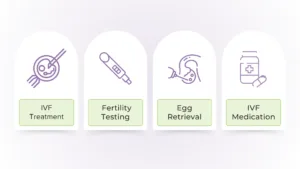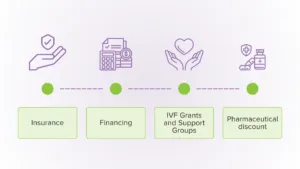If you’re checking IVF prices in California, you likely have questions about specific costs, insurance, and financing options. California offers a wide range of fertility services and clinics, making it a premier location for fertility treatment. However, understanding the costs involved, including how the price of IVF in California is structured, can help you plan and budget effectively for this procedure.
How Much is IVF in California?
The cost of IVF in California varies depending on several factors, such as the clinic, location, type of treatment, and additional services. On average, you can expect to pay anywhere from $10,000 to $15,000 per cycle for traditional IVF treatments. This price usually includes the main procedures, such embryo creation and preimplantation genetic testing, but may exclude additional expenses like medications and embryo transfer.
For those asking, “How much does IVF cost in California?” it’s important to note that costs can increase based on the complexity of your treatment needs. California is known for having some of the top IVF facilities, which can also influence pricing. While the expenses may be high, many find that the quality of care and access to advanced technology make California a valuable choice for IVF.
IVF Costs Broken Down
Understanding the price of IVF involves breaking down the main components of treatment. Each step has its own associated costs, which vary based on your unique circumstances and the specific services provided by the clinic.
IVF Treatment
IVF processes themselves come in different forms. Each type of IVF has benefits and drawbacks, so it’s worth discussing these options with your fertility specialist to determine the best choice for your needs and budget.a
Here are some options you may encounter:
- Natural IVF: This treatment involves minimal or no medication to stimulate the ovaries. Since it uses fewer drugs, it is generally less expensive,
- Mini IVF: Also known as low-stimulation IVF, mini IVF uses lower doses of medication than traditional IVF.
- Traditional IVF: This is the most common form of IVF, involving higher doses of medication to produce multiple eggs, which can increase the price.
Fertility Testing
Before beginning IVF, fertility testing is required to evaluate hormone levels and overall reproductive health. These tests vary depending on the specific tests needed and the clinic protocols. Fertility assessments can include blood tests, ultrasounds, and other diagnostic tools to help your doctor create a personalized treatment plan.
Egg Retrieval
Egg retrieval is an important part of the IVF process. Whether the eggs come from the intended mother or a donor, IVF involves taking eggs from the ovaries, fertilizing them with sperm in a lab, and then placing the embryo(s) into the uterus of the future mother or surrogate. Some clinics may bundle this fee into the total cost of IVF, while others may charge it as a separate expense.
IVF Medication
Medications for IVF can be a significant part of the cost. These drugs are necessary for stimulating the ovaries to produce eggs and preparing the body for embryo transfer. Medication costs vary widely, depending on the dosage required and the type of IVF being performed.
Additional Services for IVF
Some individuals choose to add specific services to their IVF treatment for personalized care or to increase success rates. It’s important to note these services come with their own costs.
Preimplantation Genetic Diagnosis (PGD)
Preimplantation Genetic Diagnosis (PGD) is a special procedure that tests embryos for genetic conditions before they’re placed in the uterus. This process helps identify genetic issues in embryos, allowing doctors to select only healthy ones for transfer.
PGD is often recommended for parents who have a known genetic disorder or carry a specific condition, such as cystic fibrosis, Tay-Sachs disease, or muscular dystrophy. It’s also suggested for intended parents who have experienced multiple pregnancy losses or failed IVF cycles that may be related to genetic problems.
The PGD process involves removing a few cells from the embryo, usually on day 5 when it has grown to the blastocyst stage. These cells are then tested for genetic conditions, and the results help guide the selection of healthy embryos, reducing the risk of passing on genetic disorders.
Preimplantation Genetic Screening (PGS)
Preimplantation Genetic Screening (PGS), also called Preimplantation Genetic Testing for Aneuploidy (PGT-A), checks embryos for chromosomal issues before transfer. Unlike PGD, which looks for specific genetic conditions, PGS checks the overall chromosomal health of the embryo.
PGS is often recommended for women over the age of 35, intended parents who have had multiple miscarriages, failed IVF cycles, have a history of chromosomal issues, or have a child with a chromosomal abnormality.
The PGS process is similar to PGD. It involves taking a few cells from the embryo at the blastocyst stage and analyzing them. The results help doctors identify embryos with a normal number of chromosomes, increasing the chances of a successful pregnancy and a healthy baby.
Embryo Freezing
After the eggs are collected and fertilized with sperm in the lab, the resulting embryos can be frozen for future use. Whether you are using your own eggs or donor eggs, if you want to try again later, you won’t need to repeat the entire IVF process with ovarian stimulation and egg retrieval.
Freezing embryos is helpful when there are several high-quality embryos from an IVF cycle. Most transfers involve placing just one embryo to avoid the risks of multiple pregnancies, which can be risky for both mother and baby. Freezing extra embryos also helps if you need to do genetic testing before choosing which embryo to transfer, as results can take a few weeks.
Assisted Hatching
Assisted hatching is an IVF technique used to improve the chances of an embryo attaching successfully to the uterus. It involves making a tiny opening or thinning the outer layer of the embryo, to help it “hatch” and begin the implantation process. This method is usually recommended in certain cases, such as when the mother is older, previous IVF attempts have failed, or during a Frozen Embryo Transfer (FET).
Assisted hatching is not suitable for everyone and should be considered only after a fertility specialist evaluates your specific situation. There are some risks, like potential damage to the embryo and a higher chance of multiple pregnancies, so it’s important to discuss these with your healthcare provider before deciding.
Paying for IVF Treatments
Since the IVF in California cost is usually higher, many people explore options to help cover costs. Here are some strategies that may assist with payment.
Insurance
While California has fertility-friendly policies, most insurance plans do not fully cover IVF. However, some insurance providers may cover portions of the treatment, like fertility testing or medication. Check with your insurance provider to understand what is included and whether there are coverage options for IVF.
Financing
Many fertility clinics in California offer financing options that allow you to spread the cost over time. Financing plans can help make IVF more affordable, with monthly payments and interest rates that vary depending on your credit score and the financial institution. Some fertility-focused loan programs also specialize in helping families finance IVF treatments.
IVF Grants and Support Groups
Several nonprofit organizations provide grants to help families with IVF costs. These grants can be competitive but may offer a substantial financial boost for those who qualify. Support groups and fertility organizations may also provide information on discounts or funding resources to reduce IVF expenses.
Pharmaceutical Discount
Pharmaceutical discount programs can help lower the cost of medications for IVF. When looking into IVF expenses, it’s important to confirm that the quoted price includes medications, as these are a significant part of fertility treatment costs and can vary depending on insurance coverage. Many people find that IVF costs with insurance are often close to the self-pay prices offered by IVF clinics. To help make IVF more affordable, many clinics participate in prescription discount programs, offering intended patients savings on medications.
How to Budget for Your IVF Treatment
Creating a budget for IVF can help reduce financial stress and keep your treatment on track. Here are some tips to help manage your IVF expenses:
- Research Clinics and Compare Prices: IVF costs vary by clinic, so it’s wise to research multiple facilities to find one that fits your budget and offers quality care.
- Evaluate Your Financial Situation: Assess your current finances to determine how much you can realistically pay each month toward your treatment.
- Ask About Bundled Packages: Some clinics offer discounted packages for multiple cycles, which can reduce costs if more than one IVF attempt is needed.
- Plan for Unexpected Expenses: It’s helpful to set aside funds for any additional treatments or services that may arise, such as genetic testing or fertility preservation.
IVF Services in California
California is considered a premier destination for IVF due to its high-quality clinics, advanced technology, and supportive legal landscape for fertility treatments. California offers a variety of options, from small, personalized clinics to larger, specialized fertility centers. Many clinics in California feature modern labs, experienced fertility specialists, and tailored treatment plans to increase your chances of a successful pregnancy.
FAQs
How Much IVF Cost in California?
IVF in California prices may vary depending on factors such as the clinic and the specific treatment type.
Does California cover IVF?
While California mandates some fertility coverage, IVF is generally not fully covered by most insurance plans. Check with your provider to see if any portions of IVF are covered under your policy.
Is there an age limit for IVF in California?
Most clinics in California have age guidelines, generally recommending IVF for women under 45. However, if donor eggs are used, the age limit may vary, as some clinics extend treatment options for older women in these cases. Policies differ by clinic, so it’s best to discuss options with a fertility specialist.
Is IVF tax deductible in California?
Yes, medical expenses, including IVF, can be tax-deductible if they exceed a certain percentage of your adjusted gross income. Consult with a tax professional to understand specific deductions.
IVF is a popular fertility treatment that has helped many individuals and couples build their families. While IVF prices in California may be high, its top-quality clinics make it a desirable destination for those seeking fertility treatments. By understanding how much is IVF treatment in California you can approach it with a clearer perspective and a manageable budget. With supportive resources, flexible payment plans, and advanced fertility technology, California can offer hope and possibilities for many parents looking to build their families.

























